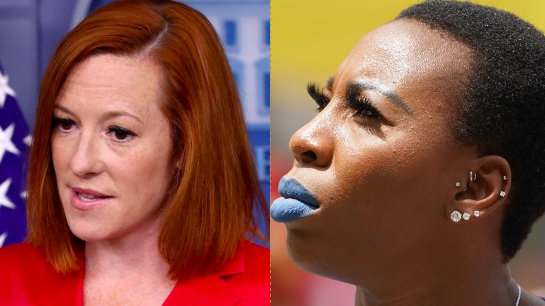Update (June 29, 2021): The White House defended Olympian Gwen Berry and her constitutional right to protest on Monday reports The New York Post.
Over the weekend, Berry won the bronze medal in the hammer throw, covered herself in a shirt that read “Activist Athlete” and turned away from the flag while the National Anthem played. Though, Berry said she felt "set up" as the anthem doesn't usually play at that time.
Nonetheless, when a White House reporter asked Press Secretary Jen Psaki where the Biden Administration stood on the matter, Psaki defended Berry’s right to protest on the public stage.
“I haven’t spoken to the President specifically about this, but I know he’s incredibly proud to be an American and has great respect for the anthem and all that it represents, especially for our men and women serving in uniform all around the world,” Psaki said at her daily press briefing,” Psaki said.
“He would also say, of course, that part of that pride in our country means recognizing there are moments where we are — as a country, haven’t lived up to our highest ideals," she added. "And it means respecting the rights of people granted to them in the Constitution to peacefully protest."
While Berry’s protest may have been backed by the White House, many felt that her actions were “unpatriotic.” She has drawn criticism from Sen. Ted Cruz (R-TX), former U.S. Department of Education Press Secretary Angela Morabito, and Rep. Dan Crenshaw (R-TX), who called for Berry to be dismissed from the Olympic team per Yahoo.
At the Tokyo Olympics, public displays of protest are prohibited during the games under Rule 50. According to the language of the ruling, athletes are barred from demonstrations that are “political, religious or racial propaganda is permitted in any Olympic sites, venues or other areas.”
Original (June 27, 2021): Activist and Olympic hopeful Gwen Berry turned her back on the flag during an Olympic trail metal ceremony in Oregon, but feels the timing was intentional on the part of organizers. Berry, who won a bronze in a competition for the hammer throw, first turned towards the stands, away from the flag and then draped her t-shirt, which featured the words “Activist Athlete,” over her head in apparent protest.
The athlete, who has in the past been very vocal about her activism, told the Associated Press that she felt “like it was a set-up, and they did it on purpose.”
Anthems aren't typically played to accompany medal ceremonies at the trials.
USA Track and Field spokeswoman Susan Hazzard told ESPN that "the national anthem was scheduled to play at 5:20 p.m. today. We didn't wait until the athletes were on the podium for the hammer throw awards. The national anthem is played every day according to a previously published schedule.''
However, that Saturday, the music started at 5:25 p.m.
"They said they were going to play it before we walked out, then they played it when we were out there,'' Berry said to ESPN. "But I don't really want to talk about the anthem because that's not important. The anthem doesn't speak for me. It never has.''
In the summer of 2019, Berry was sanctioned for raising her fist on the podium after winning the Pan-Am games. According to ESPEN, this ruling was instrumental in getting the U.S. Olympic and Paralympic Committee to commit to not punishing athletes who use their position to raise awareness for social causes by raising fists or kneeling.
Berry's third place win in the trials guarantees her a place at the Olympics, however the International Olympic Committee has taken a much different tactic from the U.S. Olympic and Paralympic Committee, saying instead that it will enforce its Rule 50, which bans demonstrations inside the lines.
It was this rule that caused sprinters Tommie Smith and John Carlos to be sent home from the Mexico City Games and stripped of their medals in 1968 for raising their fists in a now iconic protest of racial injustice in the US.
Berry's has remained adamant about using her position to raise awareness about social injustices in the Black community regardless. She maintains that her ultimate goal is larger than just a trip to the Olympics.
“My purpose and my mission is bigger than sports,” Berry said. “I’m here to represent those … who died due to systemic racism. That’s the important part. That’s why I’m going. That’s why I’m here today.”
